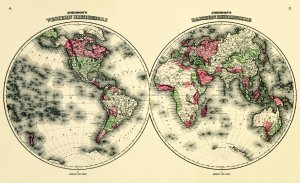
Donald Trump speaking at CPAC 2011 in Washington, D.C. Photo by Gage Skidmore.
As the last few weeks of the election dragged on, Donald Trump’s campaign became yet another vestige of the white male heteropatriarchy.
Trump’s insistence that the election was “rigged,” his reliance on false narratives that lifted him up, his refusal to accept responsibility for his behavior, and his indignant reactions to being called out all exemplify what scholars call “white male fragility.”
Robin DiAngelo, a widely cited scholar on white fragility, defines it as “a state in which even a minimum amount of racial stress becomes intolerable, triggering a range of defensive moves.” In other words, white fragility is what happens when white people have to face racism and white supremacy – systemic or their own – and react by lashing out.
Sound familiar?
Expanding this kind of definition to encompass male privilege as well, it becomes clear how Donald Trump represents this kind of social condition.
White folks, DiAngelo explains, are used to insular and segregated environments. They’re used to their privilege, even if they’re aware of it. And they cling to that as a sense of “safety,” as what is “normal,” and as what is “safe.” When things crop up that infringe on their own false reality – one shaped by white supremacy – they react with anger and frustration because they feel slighted.
This is something we’ve talked about at Everyday Feminism before. Being aware of our privilege shouldn’t make us feel like bad people, but it can. And part of acknowledging our privilege needs to be embracing the notion of surrendering some of it to create real equality and equity. We’re used to operating with privilege, so much so that being faced with losing it can make us feel like our way of life is threatened.
How we react to that defines the space we occupy in this world. Reacting to it with anger and defensiveness, like a knee-jerk privilege-check temper-tantrum for adults, is not an effective way of engaging.
But it’s Donald Trump’s way. And that’s because it’s the way which upholds white supremacy and patriarchy. It’s the way of white male fragility – and here are some classic examples of how.
1. Blaming His Faults and Losses on a ‘Rigged System’
White supremacy and patriarchy decide many of the messages that we consume about ourselves. In a society like ours, which still hinges on structural inequality tilted in favor of white folks and (primarily cisgender) men, those messages are different for white men than they are for a lot of the rest of us.
I grew up internalizing white beauty ideals – ideals that, I would come to realize, simply weren’t attainable to someone who was mixed race. That didn’t stop me, though, from internalizing the explicit message that specific kinds of white women were attractive, and that I wasn’t.
This is an example of how women grow up internalizing messages that we aren’t enough, and that our worth is defined through men. It’s also an example of how people of color grow up internalizing stereotypes about their own communities and learn that their behavior should be defined through whiteness and make white people comfortable.
White men, though? For the most part, our society tells white men that they’re just dandy.
It isn’t that all white men are bad, or that they don’t deserve to be affirmed – it’s that privilege manifests in our culture by excusing and affirming white men, but is often unforgiving and unfeeling toward everyone else.
Which explains Donald Trump’s narrative – and why it reeks of white male privilege.
A “rigged election?” In a political landscape where a woman was vying to be the first-ever female president and people of color are literally denied their right to vote at the polls, it rings hollow to hear a rich, white dude talk about how the odds are stacked against him. (The odds, Donald, were ever in your favor – evidenced by the fact that you won.)
His fear of losing wasn’t centered on his own need to succeed – it was shaped by his upbringing in a world that told him his whiteness and his maleness entitled him to all the things he’d ever wanted.
White men often act in line with white male fragility when they’re confronted with the possibility of failure. Indeed, one of the ways in which sexism permeates men’s lives is that they are told, explicitly and implicitly, across realms of life, that they are expected to be successful, independent, and strong.
Men are taught to value power. Failing to obtain it is not only hard as a personal failure, but also echoes out as a failure to “be a man.”
It’s this fear of failure that likely motivates Donald Trump to refuse to accept it. Don’t get it twisted: Donald Trump is no success. He inherited money, then squandered it. He runs businesses on bankruptcy. And he nearly lost a very public race for the White House (to a woman, no less!).
And that scares the shit out of him – so he often decides to rewrite reality.
He presents himself, unrelentingly, as a huge success. He belittles people who have succeeded, like a schoolyard bully, just to build himself up.
This is what white male fragility looks like.
2. Refusing to Learn or Grow
Someone once asked me if I thought maybe, just maybe, Donald Trump had learned something this campaign.
Maybe he realized how fucked up his sexual politics are. Maybe he’ll come away from this with a newfound sense of the humanity of people of color, or at least the complexity required to solve issues like immigration reform conflicts without painting people with broad brushes.
I don’t think he will. And that’s because his white male fragility dictates that his response to any of us saying “Hey, dude, that wasn’t okay” is to stick his fingers in his ears and insist that we’re wrong. Rather than look analytically at his own actions, Donald Trump would like to pretend all of it is just fine.
For folks with privilege, oppression is the “backdrop” to their lives. As DiAngelo notes in her piece on white fragility, racial differences – and racial prejudice – shape the way they exist in the world.
This is also true of men, who benefit greatly – often in invisible ways – from sexism in their everyday lives.
A defining part of white fragility is that white folks lack the “stamina” to have hard conversations about race. (Ironic, Donald.) They’ve never had to define themselves as “white” the way people of color are given no option than to box themselves in as “Black” or “Brown,” and conversations about race often reveal that white folks’ realities come from their places of privilege.
So a knee-jerk reaction to being confronted about race or racism is for white folks to feel victimized and upset.
White male fragility, in this way, is a defining part of Donald Trump’s image. When he’s been called out on the ways in which his behavior is problematic, he’s brushed it off in seconds.
Donald Trump is “not un-proud” of his sexism. He insists he’s saying things “like it is” – like nobody else wants to “admit” it is – when he says all Mexicans are rapists. He thinks he has the capability to understand not only his own experiences, but the experiences of women and people of color even better than women and people of color.
And until he’s ready to get past that knee-jerk response and accept that he has a lot to learn, his white male fragility makes it impossible to break through and do right by the folks who suffer because of how his privilege advances him.
3. Insisting That Reality Is an ‘Attack’
Marginalized folks don’t get to have our race and gender treated as the “norm.” We reckon with race because we face racism. We reckon with gender because we hit glass ceilings. We’re reminded, in tiny ways and larger ones, on a daily basis, that we are “others” – that we’re up against great odds, and that we’re seen as less than.
We go to movies about people who don’t look or think like us. We read books about people who don’t come from our native lands. We are asked to function in a world built for cis straight white men of wealth, and if we can’t fit, we’re told to internalize that as failure.
But Donald Trump, and men like him, are the norm. They’re given a free pass to view race, ethnicity, and gender as “someone else’s” thing.
And threatening that norm? Well, white male fragility dictates that when people do that, white men can take it personally.
A part of privilege is being able to deny and reframe reality. Men and white folks do this all the time. (It’s also a big part of gaslighting, one of Donald Trump’s favorite things to do.) Because whiteness and maleness are the norm, white men get to view their own perspectives and opinions as true, and thus their own reality as fact, even if it runs contrary to the truth.
It was white masculinity that enabled Donald Trump to insist that despite polling, he was always ahead. And it’s white masculinity that enables Donald Trump to refuse to listen to the opinions of folks with experiences different than his own – even when he’s talking about their experiences.
But more than anything, it’s white masculinity that enables Donald Trump to never have to say he’s sorry. And it’s white masculinity that enables him to get angry when he’s confronted with a reality that doesn’t align with his own.
Donald Trump has repeatedly tried to fight back against the reality of his own actions – things he’s admitted to doing, said with his own mouth, or bragged about on behind-the-scenes Access Hollywood tapes – by saying that bringing them up is an “attack.”
Hillary Clinton was “such a nasty woman” for bringing up his taxes, but he’s not “un-proud” of his own penchant for sexual assault. Her running ads that use his literal quotes about women to tell voters about his character is an “attack,” but his supporters carrying around dolls in her likeness with nooses around their necks is apparently chill.
Donald Trump doesn’t want to grow or learn – because that’s uncomfortable.
He doesn’t want to reckon with the realities of his own actions because in his false reality, he’s permitted to do those things and shouldn’t be subject to criticism over them. His white male fragility won’t let him internalize and analyze attacks against his version of the world – he just wants to continue being lost in it until it becomes everyone else’s, too.
***
Donald Trump, man of a million offenses and now president-elect, has provided us all with a living, breathing package of feminist coursework. He’s shown us what hegemonic masculinity looks like in action, moved us all through examples of abusive behavior, and reminded us what unchecked white privilege looks like.
And while the outcome of this election is terrifying, the process has been valuable in a way, if only that it’s made a lot of us look harder at ourselves and our communities.
Although it’s undeniable that Donald Trump embodies, in many ways, the parts of the patriarchy we’re all committed to fighting, he’s also not an outlier. What he stands for is not a him problem – it’s an us problem.
We’re not waging a battle only against Donald Trump, the person – we’re here and ready to fight against Donald Trump, the concept.
We’re not just fighting against Donald Trump. We’re fighting against the culture that created him.
[do_widget id=’text-101′]
Carmen Rios is a Contributing Writer for Everyday Feminism. She splits her time disparately between feminist rabble-rousing, writing, public speaking, and flower-picking. A professional feminist by day and overemotional writer by night, Carmen is currently Communications Coordinator at the Feminist Majority Foundation and the Feminism and Community Editor at Autostraddle. You can follow her on Twitter @carmenriosss and Tumblr to learn more about her feelings.
Search our 3000+ articles!
Read our articles about:
Our online racial justice training
Used by hundreds of universities, non-profits, and businesses.
Click to learn more




















